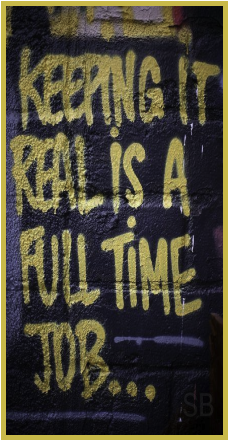Extroverts are Naturally Great Speakers: Introverts Are Not?
Jun 16, 2021
The BIGGEST Myth of Them All
(in my opinion)
A couple of weeks ago I took a run at myths around good communicators- and one thing I promised to return to is the introversion/extroversion myth.
Boy oh boy, this is a big one, and I hear about it ALL THE TIME. The argument goes something like this: “Oh, she’s an extrovert, so she’s - of course - going to be a great public speaker/conversationalist/leader etc. etc. I’m an introvert, so…..”
To which I invariably say, “‘So’ what?”
This pulls women up short: first of all, they’ve used this excuse (and it IS an excuse, btw) in the past, and no one has called it out. In all likelihood, previous encounters had listeners sagely nodding in sympathy, each supporting the other in this misconception.
Second, because they very possibly believe this idea, my abrupt challenge is shocking and a wee bit rude (despite my attempts to soften it…a bit).
On the other side we have the extroverts. Those are the ones (and I’m gonna be straight up here: it’s almost always the extroverted men) who say things like, “I’m an extrovert, so when it comes to public speaking and conversation, you know….-” wink wink nudge nudge.
To this, I respond: “No, I don’t know. Know what?”
Often I get another wink and nudge. I play stupid. I really want them to say it. I am truly a shit disturber.
Eventually, they’ll come up with some variation of: “I’m a natural - people think I’m a great communicator/people tell me I’m a great public speaker/I’m great at conversations”.
Is that so?
Just the (hard) facts, ma’am
Where do these gems (both sides of the same coin) come from? Well, that’s easy: we think that talking a lot equals extroversion. We think extroversion means that the individual is, therefore, good at speaking.
Likewise, we associated introversion with quietness, and quietness with not being a good speaker (sort of the ‘practice makes perfect’ argument, but in reverse).
You may or may not know this, but extroversion and introversion have NOTHING to do with speaking, communicating, vivacity, and so on.
Read that sentence again.
NOTHING TO DO WITH COMMUNICATION.
For realsies.
Extroversion and introversion have more to do with how we recharge than anything else. An extrovert recharges EXTERNALLY - that is, in interaction with the world (people, places, activities, action), or more stimulation.
Introverts, on the other hand, juice back up by going INTERNAL. For them, rejuvenation is something that comes from rest, quiet, reflection, solitude, contemplation - less stimulation.
This is a simplification, you should know. Further, no one is purely one or the other: we shift and fluctuate depending on the situation, among other things. But, yes, we have dominant tendencies.
This is the Part Where I Blow Your Mind
So, we have these (mis)conceptions about introversion and extroversion and communication ability/style, right? And even when I tell you what the research shows, you’re still secretly doubtful, right?
Yeah. Not surprised. But here’s something that might surprise you…..I AM AN INTROVERT. And not just a little bit of one, either. No matter what type of psychological assessment I take, over and over, for thirty years now, I have come out as an introvert.
Know what else?? For thirty years I’ve ALSO taught presentation, empowerment and the transformational nature of authenticity in communication.
Huh.
Doesn’t add up...does it?
Well, yes, it actually does, if we look at the research.
Here’s a great example: I am an introvert.
My husband is an extrovert.
When people who know us socially find this out, they cannot believe it - I’m the storyteller, conversationalist, life of the party. He’s the quiet sidekick. It’s NEVER been NOT this way. Even when I intentionally bow out, and just watch, he never says much (so it’s not me stealing the glory).
The difference lies in how we each react to this party: for me, I can bring the witty repartee for about 4 hours - then I have to evacuate (and truthfully, I’m pretty bagged after about 90 minutes of being “on”). Basically, my charge runs down.
My husband, on the other hand, gets more and more energized by being with people in this environment. Pretty soon guitars come out, a turducken might be improvised, and the night gets rrreeeaaaallllllyyyy long. The next day he feels like a million bucks.
Yet I’m the talker, and he isn’t.
Keeping it Real - and Other Occupational Hazards

Where does this leave us? Well, now that we’ve established that the talking/not talking thing has nothing to do with the introversion/extroversion thing, let’s take on the “naturally great speakers” part.
Again, to be clear: being a talker does not make you a GREAT talker. Being a ‘not talker’ does not NOT make a great talker (speaker / communicator / presenter / storyteller...you get the idea).
No correlation. Nada.
Some of the best speakers, storytellers, conversationalists, and purveyors of bon mots (like me) introverts with badass speaking skills. I have learned these: left to my own devices, I’d probably hermit forever (which is why so many introverts have actually done so well during COVID-19 lockdowns, tbh).
It just so happens the gods have a great sense of humour, and they made me an introvert with a passion for communication. Go figure.
As a result, I’ve dedicated my whole life to being better (myself), making conditions better for others (primarily women and children), and teaching/coaching so that others can develop the same skills and use them with confidence….regardless of their introversion/extroversion alignment.
I want to be extra-clear right now: I have worked with clinically shy individuals before (children and adults) - introversion and this clinical situation are NOT the same thing.
I have also worked with those that have anxiety disorders - and again, that’s not the same thing as “being shy” OR “having speaking nerves” (though it can certainly look that way).
These folks are in a different place in their journey, and my subsequent approach reflects that - so don’t go thinking it’s “one size fits all”!
The Missing Link

So, to recap: talking does not equal “quality”. Extroversion does not equal “talker”. It follows, then, that “talker” does not equal “quality”. Isn’t that a spiffy syllogism?? I think it’s a syllogism, anyways ;-)
I’ve endeavoured to shoot all kinds of holes in the argument that introverts can’t speak and extroverts are naturally good speakers, sure. But now what?
First of all, a memo to the extroverts: OK, guys - maybe you are a verbose individual. But don’t confuse that with being good at it (maybe you ARE good, but it isn’t a default). Here’re some of the challenges the “Chatty Chuck” extrovert actually struggles with (even if they don’t quite realize it);
- Allowing others time and space to think
- Allowing others time and space to speak
- Allowing themselves time and space to think
- Playing at being a persona rather than a person (more on this another time)
- “Putting on a Show” (rather than connecting as a communicator)
- Observing and responding to others in a way that builds stronger bridges
- Failing to make genuine, thoughtful relationships emerge from interactions - everything is superficial
- Being perceived as rude, overbearing, and generally full of themselves (sadly, ladies, that’s even more pronounced for us...take it from someone who knows)
While you *might* be entirely comfortable taking the stage or the mic, and holding forth, that doesn’t mean you’re doing so in a way that is productive, positive or - frankly - welcome.
If you’re an extrovert who’s on the quieter side (like my husband), realize that you might be easily intimidated by the verbose extroverts, and this may lead you to convincing yourself you’re an introvert.
The real question is where do you get your energy? You, too, can learn and apply communication skills, and perhaps even more effectively than the more verbal of your fellow extroverts, because of your inclination of being energized by stimulus while not being driven to be heard at all costs.
Second of all, a note to the introverts: you may find that you are a quiet introvert, and that’s entirely normal and perfectly fine. However, I encourage you to consider whether you are using that aspect of your personality as a shield to “protect” yourself from the risks that you may perceive around speaking (whether that’s in conversation or on a stage - and everything in-between).
As always, you can learn and apply the skills and build the confidence to be heard when you want or need to - but the trick for you will be to conserve your energy and preserve your stimulus-free moments so that you have the energy that communication does take.
And if you’re like me, a verbose introvert - know that life can be exhausting. The constant push-pull between the need to be in the “Zen Zone” and the urge to communicate grinds you down. Plus, you are also prone to that list of “Chatty Chuck” dangers. In some ways, even more so - and this is because you may be using the chattiness (in part) as a buffer against situational stimulation. In other words, you’re protecting by deflecting.
This is something I know ALL about. I’m probably the queen of it. When I’m really uncomfortable, you simply can’t shut me up. It’s how my husband knows when I need to be extracted from a situation (like a hostage).
Now that you know the truth (and the myth has been ground to dust), I encourage you to take some time to consider: a) how do YOU rejuvenate and recharge? b) how do YOU energize? c) what beliefs (and behaviours) do YOU have around communication that might not be serving you?
Until next time!
xo as always,
d
ps. Yo! Ladies!! Have you checked out the buffet of TEEwithD™ offerings?? Courses (self-study and sessional), coaching, downloadable content, private Facebook Group, Twitter, LinkedIn, YouTube Tips with TEE, podcasts, and tons of blog content?? NO???!!! Well, WHAT ARE YOU WAITING FOR?! Check it out - and join us - NOW!! xod


